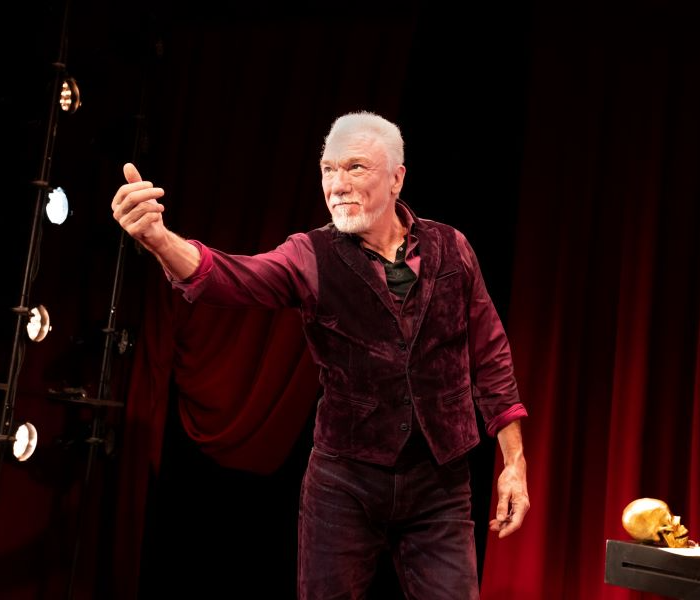Translate Page

Patrick Page in All the Devils Are Here: How Shakespeare Invented the Villain. Photo by Julieta Cervantes
The Tony-nominated actor discusses his new solo show spotlighting Shakespeare's villains
---
Patrick Page may not possess a degree in psychology but he's well-versed in psychopaths. Based on his research, there are probably a handful in his audience every night devouring his solo show All the Devils Are Here: How Shakespeare Invented the Villain, currently running Off Broadway at the DR2 Theatre. Equal parts performance, lecture and séance, Page's passion project, directed by Simon Godwin, chronicles the evolution of the Bard's baddies.
Page's interest in madmen began as he prepared to play Iago in Othello at Washington, DC's Shakespeare Theatre Company in 2005. Initially, he was reluctant to take the part—he had played the manipulative soldier in the past and had been unhappy with his performance. Then the director asked a loaded question: "Do you think Iago is a psychopath?"
"I went full bore," Page recalls about his reinvigorated approach to the role. He spent a year reading everything he could about psychopathy and even watched interviews with serial killers like Ted Bundy and Dennis Nilsen. Clearly, it worked: He ended up winning the Helen Hayes Award for his performance.
Known for his sonorous bass and imposing aura, Page has portrayed a slew of villains, Shakespearean and otherwise, throughout his career. In addition to Richard III, Claudius in Hamlet and Brutus in Julius Caesar, his dastardly performances on Broadway include Scar in The Lion King, the Green Goblin in Spider-Man Turn Off the Dark, the title character in Dr. Seuss' How the Grinch Stole Christmas! and his Tony-nominated turn as the god of the underworld in Hadestown. He's been wicked onscreen, too, most recently as the roguish Octavius Kratt in the "Schmicago" season of Schmigadoon!
All the Devils Are Here harks back to Page's youth, when he cut his teeth as a classical actor at the Utah Shakespeare Festival and Oregon Shakespeare Festival. His one-man play has been many years in the making, with earlier incarnations titled Evil Genius and Stand Up for Bastards. During the pandemic shutdown, Shakespeare Theatre Company, with which Page has a decades-long history, let him film a version to stream. But it was his triumphant performance in King Lear earlier this year, also directed by Simon Godwin, that inspired the actor to bring the show to New York.
Page insists the key to playing compelling villains is to never dismiss them as purely evil. He approaches each one with empathy and curiosity and asks how the character's past may be motivating his present actions. "I find that all of these questions need to be answered for myself, and when they are then the text can flow out easily," says Page. "If I have a fully dimensional, realistic view of the person, then I can let that person talk. Otherwise, it's just me making faces and voices."
One of his techniques for getting into that amoral mindset is to walk around the city imagining himself as the character, playing a game of what would this villain do? "For example, if Iago sits down at a restaurant and sees that someone's left a big tip on the table, there's simply nothing that prevents him from just picking it up if he thinks he can get away with it," Page says. "If he sees a woman's handbag, nothing prevents him from taking it. The world is a series of opportunities and populated by suckers" for Iago (but not Page—this is all pretend!).
A 90-minute immersion into classical brutes may sound deadly serious, but All the Devils Are Here contains many lighthearted moments. These bad guys have good senses of humor.
"Characters like Richard III or Iago or Edmund think of life as a game, something to win or lose," Page says. "Villains, structurally, have to win until the end of the play, so they have a lot of fun along the way. The hero has the opposite problem: obstacles to overcome. The villain has obstacles, too, but overcomes them, usually with relish."
In between Shakespearean monologues and scenes, Page shares his insights into the characters as well as a list of traits of a psychopath. While some of the Bard's characters clearly qualify, others are more ambiguous. Either way, Page says he knows how to get into their heads. "It's frighteningly easy to simply turn off that part of the brain, to have no feelings for others," he explains. "There isn't a single one of them that I don't find in myself, no matter how detestable they may seem."
Page says it's actually the heroes that frighten him more. "I find heroes, or particularly people who identify strongly with heroes, rather terrifying because they seem to be in denial of their darkness, their shadow," he says. "That's a very dangerous person because they feel they are righteous, and out of that righteousness they can really do anything."
While rooted in history and reminiscent of Steven Berkoff's Shakespeare's Villains: A Master Class in Evil, which had a hit run at The Public Theater two decades ago, All the Devils Are Here, like so much of the Bard's work, feels culturally current. Kendall Roy on Succession echoes Richard III, House of Card's Claire Underwood resembles Lady Macbeth and Scar in The Lion King follows Claudius' arc in Hamlet.
"What I find so fascinating is that at this moment when the culture is becoming more and more reflexively moralistic and we're dividing people into categories of good and bad, even in our own families, these characters are becoming more popular," Page says. "There's something about the fact that we need to watch them."
---
TDF MEMBERS: At press time, discount tickets were available for All the Devils Are Here. Go here to browse our latest discounts for dance, theatre and concerts.